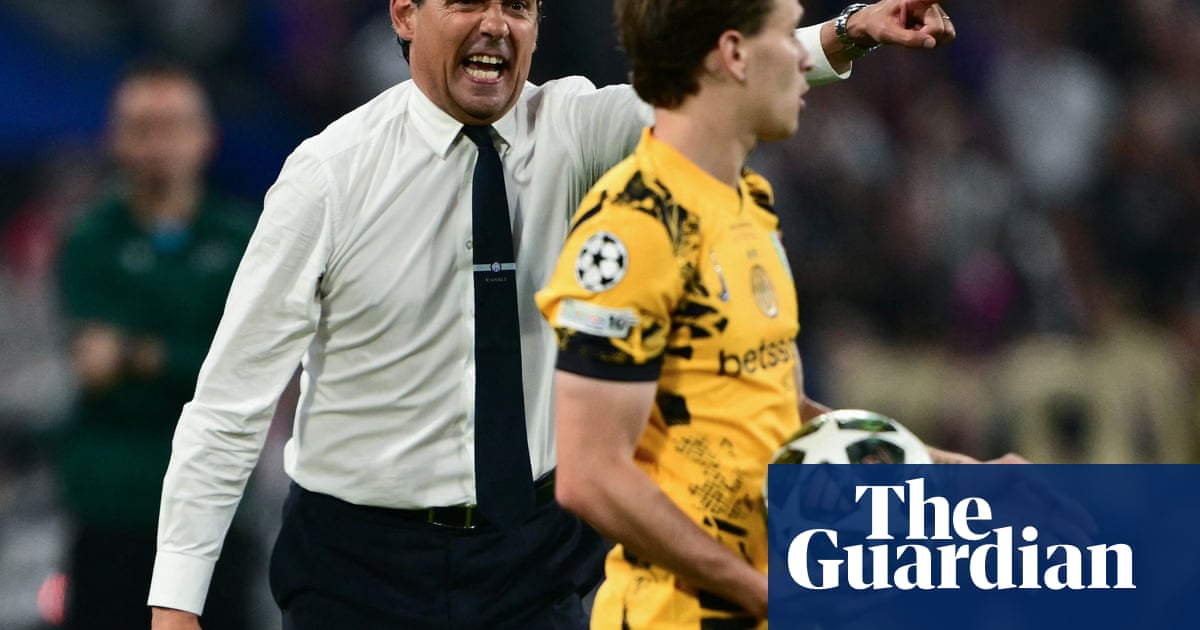On the front pages of Italy’s newspapers, the Champions League final was told as a “nightmare”, a “humiliation”, and a “rout”. Tuttosport at least found room for humour with a “DisIntergrated” pun. La Stampa, in deference to the victorsParis Saint-Germain, went instead with a French phrase: “La débâcle”.
Any team can lose a Champions League final butInternazionale were the first to do so by a five-goal margin. The final indignity of a season in which they aspired to repeat the treble they won under José Mourinho, only to come unstuck at the last: losing the Coppa Italia semi-final to neighbours Milan and thenmissing out on the Serie A titleby one point.
“It could have been all or nothing,” acknowledged Franco Vanni in La Repubblica. “It was nothing, in the most painful way possible. A sort of reverse perfection … a climax of suffering which is the photographic negative of the joys of 2010, year of the Inter treble and the last Italian joy [in this competition].”
Everywhere there was acknowledgment of Paris Saint-Germain’s quality and the astonishing job Luis Enrique has done in remaking this team according to his vision: young, dynamic, furiously competitive. But the focus, understandably, for Italian audiences was on how their own league’s representatives could bow out so meekly.
What had happened to the relentless mindset that allowed this team to score 11 times in four games against Barcelona and Bayern Munich? “I’m sure no Inter lineup would have had a chance against this PSG,” said the veteran pundit Paolo Condòin a video blog for Il Corriere dello Sport. “But even if you are slipping into the abyss, in a final you have a duty to try.”
Simone Inzaghi was criticised for being outschemed by Luis Enrique and for failing to adapt after the game had begun. La Gazzetta Sportiva rated his performance as a 3/10 – even lower than the score they gave to the worst player, Federico Dimarco. “[Inzaghi] does not understand a thing of PSG’s rotations and press,” ran the accompanying text. “Almost embarrassing choices on the substitutions. Maybe he will remake himself in the AsianChampions League. Maybe.”
Inzaghi is reported to have received a substantial contract offer to take over as manager of Al-Hilal in the Saudi Pro League, though he declined to talk about his future after the final. He had said repeatedly in the buildup to the game that he plans to meet with Inter’s directors on Tuesday.
This result, unquestionably, had changed the context of their discussions. “And now, the cruelty of the question and of doubt,” wrote Maurizio Crosetti for La Repubblica. “Is Simone Inzaghi the manager who took Inter within a step of winning it all, or is he the manager who in four years lost two scudetti badly and as many Champions League finals?
“If he had won this cup, maybe Inzaghi could have left more easily, like Mourinho after Madrid. And yet, after this, how can he stay?” Comparisons withthe Special Onewere impossible to escape. As Leo Turrini put it in Quotidiano Sportivo, “This season that made fans dream of a repeat of Mourinho’s treble ended with the equally Mourinho-ian ‘Zeru tituli’.
There were some defences of Inzaghi, too, Alberto dalla Palma noting in Il Messaggero that Inter ought still to thank their manager for four years of highly competitive performances in the Champions League, relying on many players who joined on free transfers. Gazzetta reported Inter will close this season with their highest-ever revenues and expect to report a profit – some turnaround from the €246m losses they posted in the last season before Inzaghi took charge.
But fans live for glory on the pitch, not the balance sheet. “From yesterday, for Inter supporters, Munich in Bavaria is no longer the kingdom of the beloved Kalle Rummenigge nor the moor ridden by Nicolino Berti but a land of shame,” wrote Luigi Garlando in the pink paper. “You should never use this word for sporting things, but when the fans experience embarrassment at such a bewildering, humiliating display, so much that they suffer just for their sense of belonging, there is no more appropriate term. A disgrace for Italian football, too.”
“A sporting massacre,a Korea, a Mineirazo,” he continued, referencing the most infamous World Cup defeats suffered by Italy and Germany. “Thank goodness Inter played in yellow. The black-and-blue colours weren’t soiled, but the club’s glorious European history was.”
